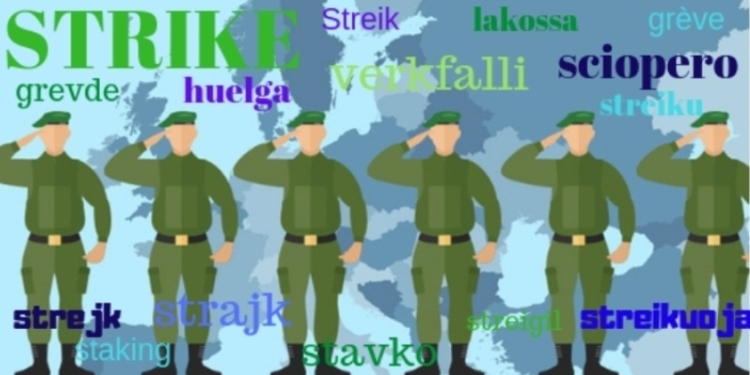The Right to Strike: Like a Bull in a China Shop?
Let me start this article by summarizing in a few lines what EUROMIL is all about. EUROMIL is committed to the principle of “Citizen in Uniform” and particularly demands (1) equal rights and treatment of soldiers, (2) the right of servicemen and -women to form and join trade unions and independent staff associations and (3) the inclusion of military associations and trade unions in a regular social dialogue by the authorities.
Looking at these fundamental principles, it is very strange that in most of the talks we have all over Europe and beyond, a remark pops up on the right to strike. More concretely: “It would be unacceptable that soldiers go on strike”. Even if EUROMIL is not using this fundamental right for trade unions as an argument, it is very often used by those who are questioning the right of association for military personnel and use it as an argument against this right in the military.
It is a coincidence, that at the moment that trade union rights and thus also the right to strike is under discussion in some countries, the European Public Service Union (EPSU) in collaboration with the European Trade Union Institute (ETUI) published an article and 35 country factsheets on the right to strike in the public sector. Where very often military personnel believe that the right to strike is accepted all over the public sector, the study of ETUI shows that there are often considerable limitations on the right to strike in public services. Looking at the factsheets, one can find out that several groups of public sector workers are restricted or even banned from taking strike action. If not banned, at least some procedural rules and requirements to provide minimum levels of essential services limit this right for public service employees.
EPSU and ETUI describe the attempts in recent years by several governments and international institutions to undermine the right to strike for public servants. This was the case in the past years in Belgium, Germany, Greece, Italy, Spain, and the UK . On the other hand, there already are for some public sector workers bans or at least severe limitations on the right to strike. The outcome of the ETUI study makes it also clear that it is common for members of the armed forces, the security services, the judiciary, and police and prison officers to be excluded from the right to strike. There exist however some countries where for example police officers have the right to strike with some restrictions as it is the case in Belgium.
Allow me to emphasise once again that also for EUROMIL, the right to strike is a fundamental trade union right. However, the right to strike cannot be looked at as a separate right, but it must be viewed together with the right to collective bargaining as an ultimate instrument in defending workers’ rights. Allow me to quote the conclusions of the EPSU article: “As the International Trade Union Confederation (ITUC) makes clear in its report, The right to strike and the ILO, that without the right to strike, a right to collective bargaining amounts to no more than a right to “collective begging”. Given the chance, many employers will roll-back these hard-fought advances. It is crucial that European public service workers and their unions resist these attacks and defend the right to strike. As the UN Special Rapporteur on freedom of peaceful assembly and association Mr. Maina Kiai said, ‘protecting the right to strike is not simply about States fulfilling their legal obligations. It is also about them creating democratic and equitable societies that are sustainable in the long run’”
But what about the right to strike in the military? As already mentioned, EUROMIL sees the right to form and join staff associations and trade unions linked to a regular social dialogue, as its essential goal to achieve for military personnel in all European countries. We accept that, looking at the very specific nature of the military profession, it is not always evident to implement the right to strike as such in the military. However, the same kind of arguments that “the military is a specific environment that cannot be compared with other workplaces” has also been used to block the implementation of the working time directive, reduced working time, parental leave, guaranteed annual leave, …. And yet, all these directives are anno 2019 implemented in several European armed forces without harming the operationality of these armed forces.
Only in Sweden military personnel has the right to strike even if this right has never been used. In Denmark, the trade union made an agreement with the Ministry of Defence to abstain from the right to strike and follow similar regulations as other civil servants. Meanwhile a military trade union from Belgium is advocating a limited right to strike and in North Macedonia and Slovenia the right to strike for military personnel is regulated by specific laws.
But let’s be clear, the main problem in Europe is still that in too many countries to right of associations and even more specific the right to form and join trade unions, is still denied to military personnel. And even when granted, this right is to often not linked to a real social dialogue resulting in binding agreements for all parties. As long as we are not at the point of full representation for military personnel all over Europe, the right to strike will remain the bull in the (military) china shop!
Emmanuel Jacob, President

